PSY108 Introduction to Psychology: Video Games, Cognition & Training
VerifiedAdded on 2023/06/13
|7
|1449
|181
Essay
AI Summary
This essay analyzes the article “Genre may Impact Cognitive Training Using Video Games,” examining the effect of playing video games on cognition. It discusses the key assumptions made in the article, such as the impact of video game genre on cognitive training and the potential for video games to enhance brain performance. The essay evaluates the viability of these claims by referencing research on transfer effects and the influence of action games on cognitive abilities. It also considers alternative perspectives, such as the idea that video games facilitate learning new skills rather than directly impacting cognition. The conclusion reinforces the connection between video games and cognition, while acknowledging the need for further research on how different parts of the brain are influenced by game genre. The essay also highlights positive and detrimental impacts of video games, advocating for their appropriate and purposeful utilization.

Running head: VIDEO GAMES AND COGNITION 1
Video Games and Cognition
Name
Institutional Affiliation
Video Games and Cognition
Name
Institutional Affiliation
Paraphrase This Document
Need a fresh take? Get an instant paraphrase of this document with our AI Paraphraser
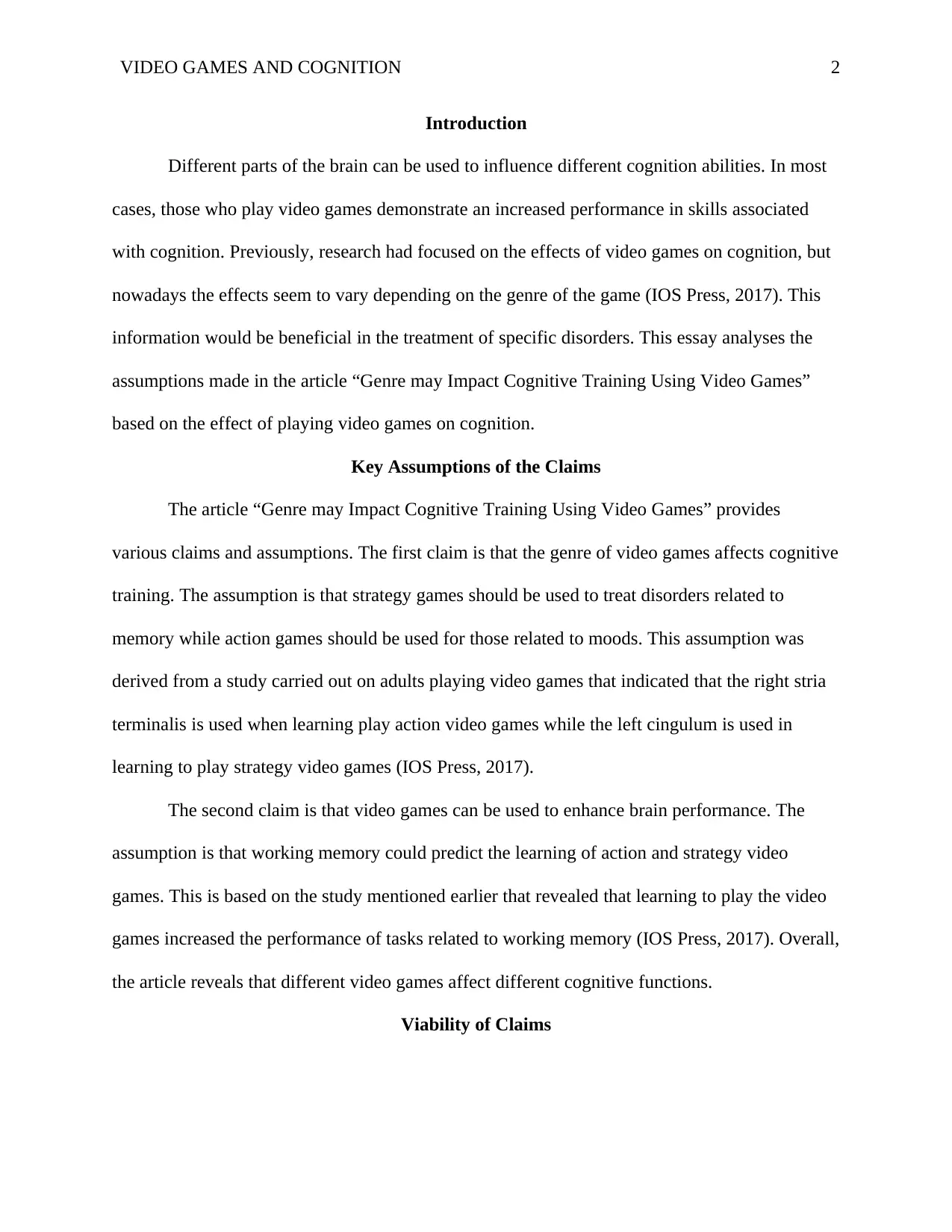
VIDEO GAMES AND COGNITION 2
Introduction
Different parts of the brain can be used to influence different cognition abilities. In most
cases, those who play video games demonstrate an increased performance in skills associated
with cognition. Previously, research had focused on the effects of video games on cognition, but
nowadays the effects seem to vary depending on the genre of the game (IOS Press, 2017). This
information would be beneficial in the treatment of specific disorders. This essay analyses the
assumptions made in the article “Genre may Impact Cognitive Training Using Video Games”
based on the effect of playing video games on cognition.
Key Assumptions of the Claims
The article “Genre may Impact Cognitive Training Using Video Games” provides
various claims and assumptions. The first claim is that the genre of video games affects cognitive
training. The assumption is that strategy games should be used to treat disorders related to
memory while action games should be used for those related to moods. This assumption was
derived from a study carried out on adults playing video games that indicated that the right stria
terminalis is used when learning play action video games while the left cingulum is used in
learning to play strategy video games (IOS Press, 2017).
The second claim is that video games can be used to enhance brain performance. The
assumption is that working memory could predict the learning of action and strategy video
games. This is based on the study mentioned earlier that revealed that learning to play the video
games increased the performance of tasks related to working memory (IOS Press, 2017). Overall,
the article reveals that different video games affect different cognitive functions.
Viability of Claims
Introduction
Different parts of the brain can be used to influence different cognition abilities. In most
cases, those who play video games demonstrate an increased performance in skills associated
with cognition. Previously, research had focused on the effects of video games on cognition, but
nowadays the effects seem to vary depending on the genre of the game (IOS Press, 2017). This
information would be beneficial in the treatment of specific disorders. This essay analyses the
assumptions made in the article “Genre may Impact Cognitive Training Using Video Games”
based on the effect of playing video games on cognition.
Key Assumptions of the Claims
The article “Genre may Impact Cognitive Training Using Video Games” provides
various claims and assumptions. The first claim is that the genre of video games affects cognitive
training. The assumption is that strategy games should be used to treat disorders related to
memory while action games should be used for those related to moods. This assumption was
derived from a study carried out on adults playing video games that indicated that the right stria
terminalis is used when learning play action video games while the left cingulum is used in
learning to play strategy video games (IOS Press, 2017).
The second claim is that video games can be used to enhance brain performance. The
assumption is that working memory could predict the learning of action and strategy video
games. This is based on the study mentioned earlier that revealed that learning to play the video
games increased the performance of tasks related to working memory (IOS Press, 2017). Overall,
the article reveals that different video games affect different cognitive functions.
Viability of Claims
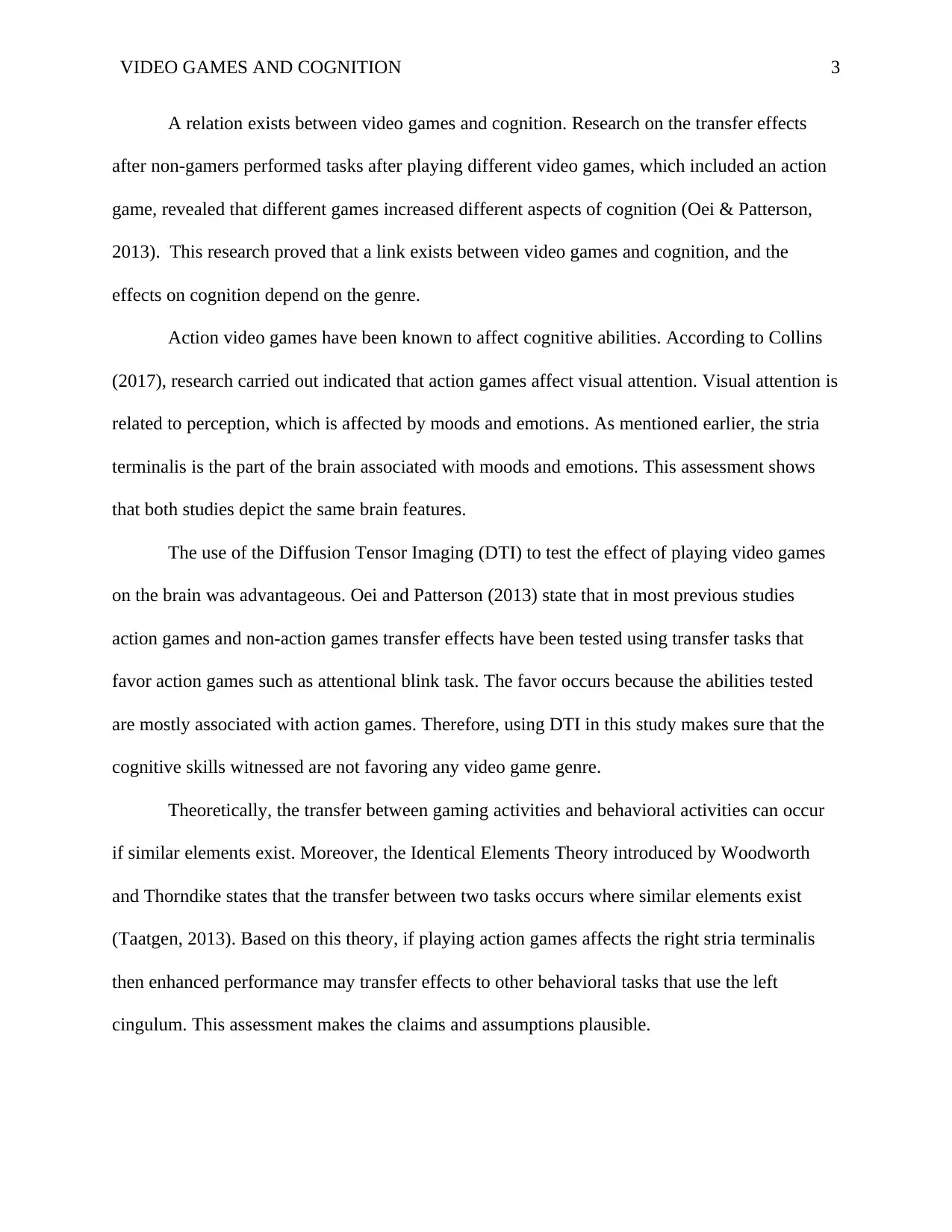
VIDEO GAMES AND COGNITION 3
A relation exists between video games and cognition. Research on the transfer effects
after non-gamers performed tasks after playing different video games, which included an action
game, revealed that different games increased different aspects of cognition (Oei & Patterson,
2013). This research proved that a link exists between video games and cognition, and the
effects on cognition depend on the genre.
Action video games have been known to affect cognitive abilities. According to Collins
(2017), research carried out indicated that action games affect visual attention. Visual attention is
related to perception, which is affected by moods and emotions. As mentioned earlier, the stria
terminalis is the part of the brain associated with moods and emotions. This assessment shows
that both studies depict the same brain features.
The use of the Diffusion Tensor Imaging (DTI) to test the effect of playing video games
on the brain was advantageous. Oei and Patterson (2013) state that in most previous studies
action games and non-action games transfer effects have been tested using transfer tasks that
favor action games such as attentional blink task. The favor occurs because the abilities tested
are mostly associated with action games. Therefore, using DTI in this study makes sure that the
cognitive skills witnessed are not favoring any video game genre.
Theoretically, the transfer between gaming activities and behavioral activities can occur
if similar elements exist. Moreover, the Identical Elements Theory introduced by Woodworth
and Thorndike states that the transfer between two tasks occurs where similar elements exist
(Taatgen, 2013). Based on this theory, if playing action games affects the right stria terminalis
then enhanced performance may transfer effects to other behavioral tasks that use the left
cingulum. This assessment makes the claims and assumptions plausible.
A relation exists between video games and cognition. Research on the transfer effects
after non-gamers performed tasks after playing different video games, which included an action
game, revealed that different games increased different aspects of cognition (Oei & Patterson,
2013). This research proved that a link exists between video games and cognition, and the
effects on cognition depend on the genre.
Action video games have been known to affect cognitive abilities. According to Collins
(2017), research carried out indicated that action games affect visual attention. Visual attention is
related to perception, which is affected by moods and emotions. As mentioned earlier, the stria
terminalis is the part of the brain associated with moods and emotions. This assessment shows
that both studies depict the same brain features.
The use of the Diffusion Tensor Imaging (DTI) to test the effect of playing video games
on the brain was advantageous. Oei and Patterson (2013) state that in most previous studies
action games and non-action games transfer effects have been tested using transfer tasks that
favor action games such as attentional blink task. The favor occurs because the abilities tested
are mostly associated with action games. Therefore, using DTI in this study makes sure that the
cognitive skills witnessed are not favoring any video game genre.
Theoretically, the transfer between gaming activities and behavioral activities can occur
if similar elements exist. Moreover, the Identical Elements Theory introduced by Woodworth
and Thorndike states that the transfer between two tasks occurs where similar elements exist
(Taatgen, 2013). Based on this theory, if playing action games affects the right stria terminalis
then enhanced performance may transfer effects to other behavioral tasks that use the left
cingulum. This assessment makes the claims and assumptions plausible.
⊘ This is a preview!⊘
Do you want full access?
Subscribe today to unlock all pages.

Trusted by 1+ million students worldwide
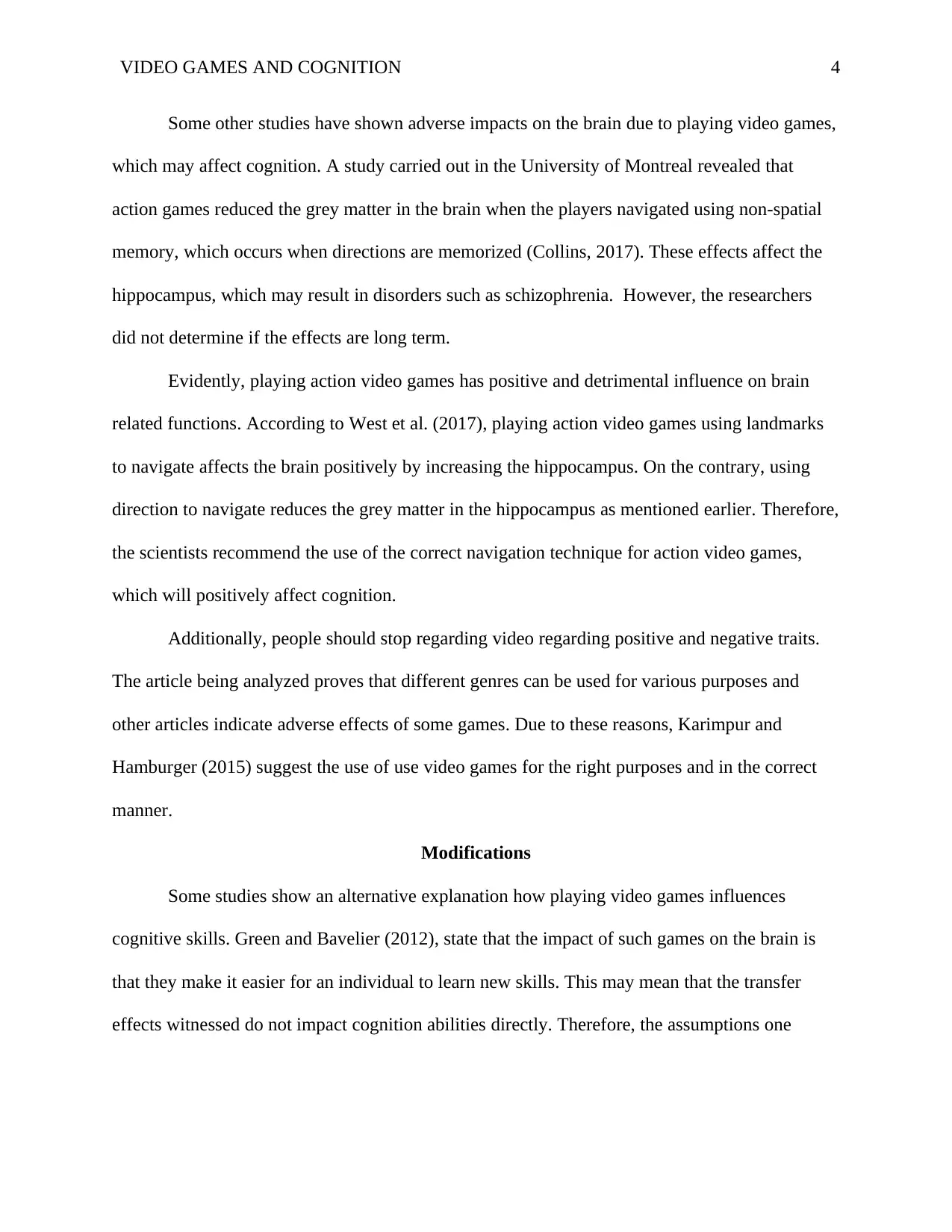
VIDEO GAMES AND COGNITION 4
Some other studies have shown adverse impacts on the brain due to playing video games,
which may affect cognition. A study carried out in the University of Montreal revealed that
action games reduced the grey matter in the brain when the players navigated using non-spatial
memory, which occurs when directions are memorized (Collins, 2017). These effects affect the
hippocampus, which may result in disorders such as schizophrenia. However, the researchers
did not determine if the effects are long term.
Evidently, playing action video games has positive and detrimental influence on brain
related functions. According to West et al. (2017), playing action video games using landmarks
to navigate affects the brain positively by increasing the hippocampus. On the contrary, using
direction to navigate reduces the grey matter in the hippocampus as mentioned earlier. Therefore,
the scientists recommend the use of the correct navigation technique for action video games,
which will positively affect cognition.
Additionally, people should stop regarding video regarding positive and negative traits.
The article being analyzed proves that different genres can be used for various purposes and
other articles indicate adverse effects of some games. Due to these reasons, Karimpur and
Hamburger (2015) suggest the use of use video games for the right purposes and in the correct
manner.
Modifications
Some studies show an alternative explanation how playing video games influences
cognitive skills. Green and Bavelier (2012), state that the impact of such games on the brain is
that they make it easier for an individual to learn new skills. This may mean that the transfer
effects witnessed do not impact cognition abilities directly. Therefore, the assumptions one
Some other studies have shown adverse impacts on the brain due to playing video games,
which may affect cognition. A study carried out in the University of Montreal revealed that
action games reduced the grey matter in the brain when the players navigated using non-spatial
memory, which occurs when directions are memorized (Collins, 2017). These effects affect the
hippocampus, which may result in disorders such as schizophrenia. However, the researchers
did not determine if the effects are long term.
Evidently, playing action video games has positive and detrimental influence on brain
related functions. According to West et al. (2017), playing action video games using landmarks
to navigate affects the brain positively by increasing the hippocampus. On the contrary, using
direction to navigate reduces the grey matter in the hippocampus as mentioned earlier. Therefore,
the scientists recommend the use of the correct navigation technique for action video games,
which will positively affect cognition.
Additionally, people should stop regarding video regarding positive and negative traits.
The article being analyzed proves that different genres can be used for various purposes and
other articles indicate adverse effects of some games. Due to these reasons, Karimpur and
Hamburger (2015) suggest the use of use video games for the right purposes and in the correct
manner.
Modifications
Some studies show an alternative explanation how playing video games influences
cognitive skills. Green and Bavelier (2012), state that the impact of such games on the brain is
that they make it easier for an individual to learn new skills. This may mean that the transfer
effects witnessed do not impact cognition abilities directly. Therefore, the assumptions one
Paraphrase This Document
Need a fresh take? Get an instant paraphrase of this document with our AI Paraphraser
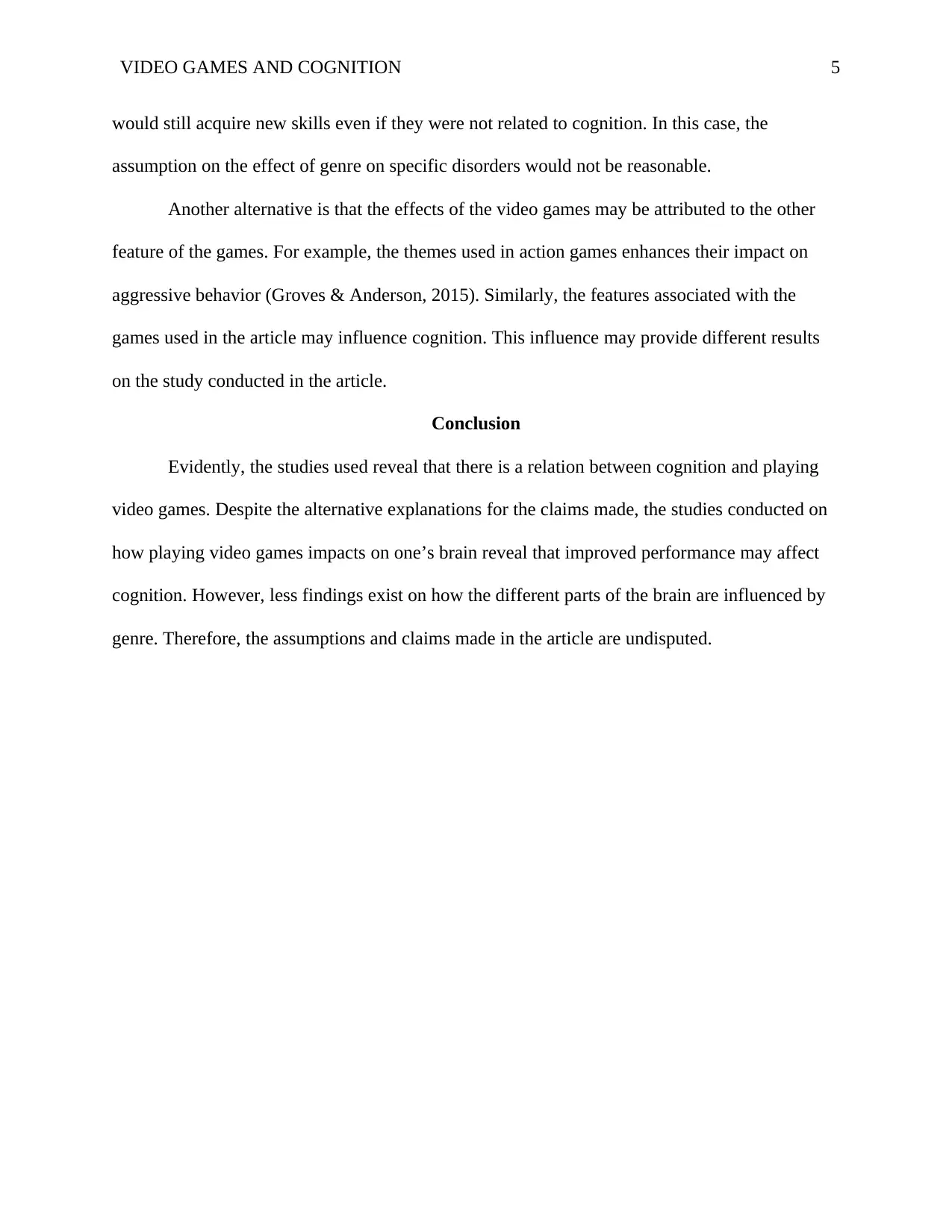
VIDEO GAMES AND COGNITION 5
would still acquire new skills even if they were not related to cognition. In this case, the
assumption on the effect of genre on specific disorders would not be reasonable.
Another alternative is that the effects of the video games may be attributed to the other
feature of the games. For example, the themes used in action games enhances their impact on
aggressive behavior (Groves & Anderson, 2015). Similarly, the features associated with the
games used in the article may influence cognition. This influence may provide different results
on the study conducted in the article.
Conclusion
Evidently, the studies used reveal that there is a relation between cognition and playing
video games. Despite the alternative explanations for the claims made, the studies conducted on
how playing video games impacts on one’s brain reveal that improved performance may affect
cognition. However, less findings exist on how the different parts of the brain are influenced by
genre. Therefore, the assumptions and claims made in the article are undisputed.
would still acquire new skills even if they were not related to cognition. In this case, the
assumption on the effect of genre on specific disorders would not be reasonable.
Another alternative is that the effects of the video games may be attributed to the other
feature of the games. For example, the themes used in action games enhances their impact on
aggressive behavior (Groves & Anderson, 2015). Similarly, the features associated with the
games used in the article may influence cognition. This influence may provide different results
on the study conducted in the article.
Conclusion
Evidently, the studies used reveal that there is a relation between cognition and playing
video games. Despite the alternative explanations for the claims made, the studies conducted on
how playing video games impacts on one’s brain reveal that improved performance may affect
cognition. However, less findings exist on how the different parts of the brain are influenced by
genre. Therefore, the assumptions and claims made in the article are undisputed.
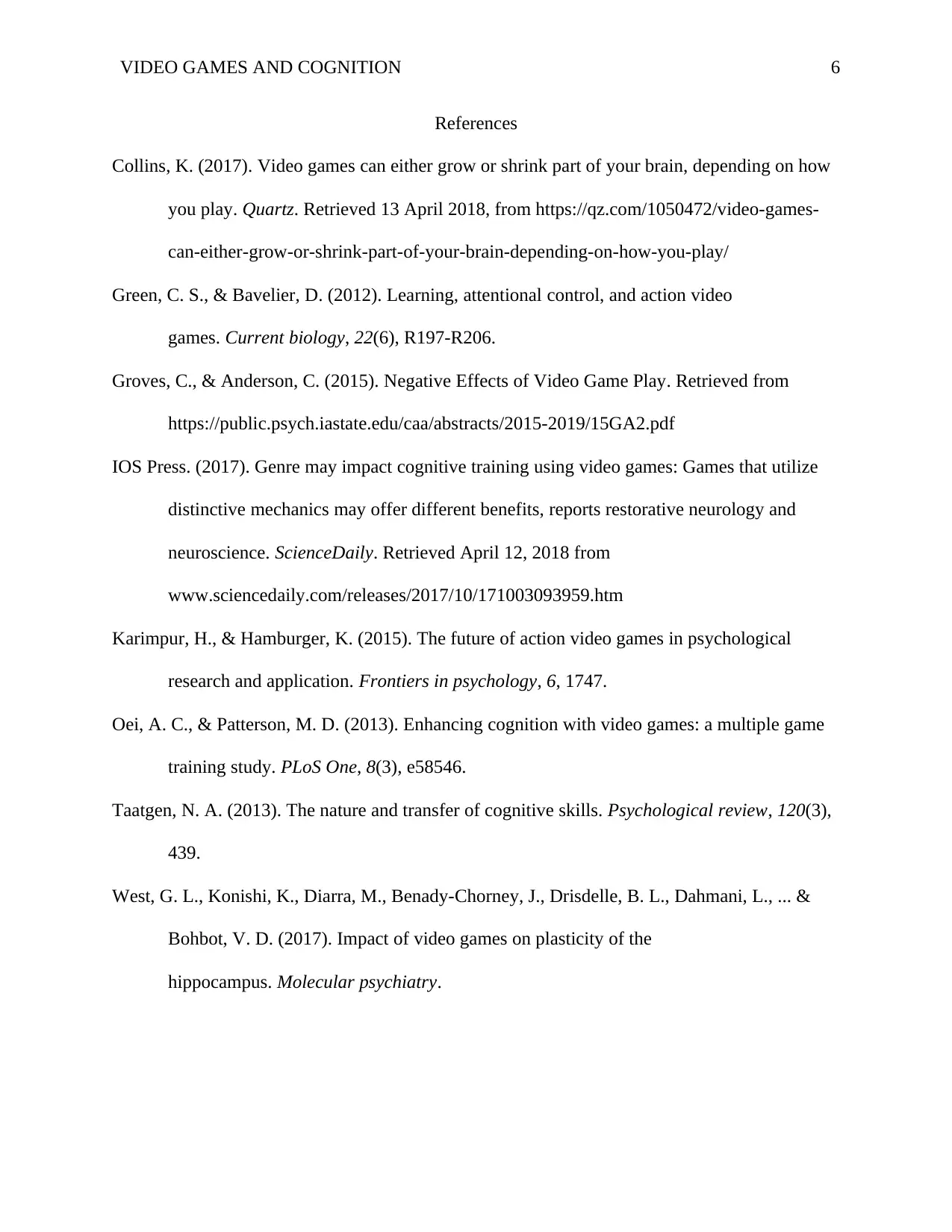
VIDEO GAMES AND COGNITION 6
References
Collins, K. (2017). Video games can either grow or shrink part of your brain, depending on how
you play. Quartz. Retrieved 13 April 2018, from https://qz.com/1050472/video-games-
can-either-grow-or-shrink-part-of-your-brain-depending-on-how-you-play/
Green, C. S., & Bavelier, D. (2012). Learning, attentional control, and action video
games. Current biology, 22(6), R197-R206.
Groves, C., & Anderson, C. (2015). Negative Effects of Video Game Play. Retrieved from
https://public.psych.iastate.edu/caa/abstracts/2015-2019/15GA2.pdf
IOS Press. (2017). Genre may impact cognitive training using video games: Games that utilize
distinctive mechanics may offer different benefits, reports restorative neurology and
neuroscience. ScienceDaily. Retrieved April 12, 2018 from
www.sciencedaily.com/releases/2017/10/171003093959.htm
Karimpur, H., & Hamburger, K. (2015). The future of action video games in psychological
research and application. Frontiers in psychology, 6, 1747.
Oei, A. C., & Patterson, M. D. (2013). Enhancing cognition with video games: a multiple game
training study. PLoS One, 8(3), e58546.
Taatgen, N. A. (2013). The nature and transfer of cognitive skills. Psychological review, 120(3),
439.
West, G. L., Konishi, K., Diarra, M., Benady-Chorney, J., Drisdelle, B. L., Dahmani, L., ... &
Bohbot, V. D. (2017). Impact of video games on plasticity of the
hippocampus. Molecular psychiatry.
References
Collins, K. (2017). Video games can either grow or shrink part of your brain, depending on how
you play. Quartz. Retrieved 13 April 2018, from https://qz.com/1050472/video-games-
can-either-grow-or-shrink-part-of-your-brain-depending-on-how-you-play/
Green, C. S., & Bavelier, D. (2012). Learning, attentional control, and action video
games. Current biology, 22(6), R197-R206.
Groves, C., & Anderson, C. (2015). Negative Effects of Video Game Play. Retrieved from
https://public.psych.iastate.edu/caa/abstracts/2015-2019/15GA2.pdf
IOS Press. (2017). Genre may impact cognitive training using video games: Games that utilize
distinctive mechanics may offer different benefits, reports restorative neurology and
neuroscience. ScienceDaily. Retrieved April 12, 2018 from
www.sciencedaily.com/releases/2017/10/171003093959.htm
Karimpur, H., & Hamburger, K. (2015). The future of action video games in psychological
research and application. Frontiers in psychology, 6, 1747.
Oei, A. C., & Patterson, M. D. (2013). Enhancing cognition with video games: a multiple game
training study. PLoS One, 8(3), e58546.
Taatgen, N. A. (2013). The nature and transfer of cognitive skills. Psychological review, 120(3),
439.
West, G. L., Konishi, K., Diarra, M., Benady-Chorney, J., Drisdelle, B. L., Dahmani, L., ... &
Bohbot, V. D. (2017). Impact of video games on plasticity of the
hippocampus. Molecular psychiatry.
⊘ This is a preview!⊘
Do you want full access?
Subscribe today to unlock all pages.

Trusted by 1+ million students worldwide

VIDEO GAMES AND COGNITION 7
1 out of 7
Related Documents
Your All-in-One AI-Powered Toolkit for Academic Success.
+13062052269
info@desklib.com
Available 24*7 on WhatsApp / Email
![[object Object]](/_next/static/media/star-bottom.7253800d.svg)
Unlock your academic potential
Copyright © 2020–2026 A2Z Services. All Rights Reserved. Developed and managed by ZUCOL.



